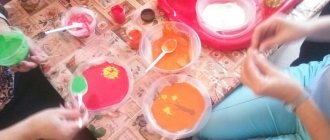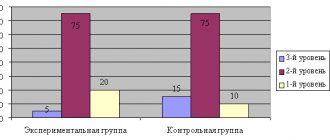Master class with parents “Raising a child should be invisible”
Target:
- identify the features of the relationship between children and parents.
— help parents analyze their parental behavior, focus on the positive aspects of raising a child, forms of showing love for him . Tasks:
- bring to the consciousness of parents the need to show their unconditional parental love
— expand parents’ understanding of the importance of the emotional component of child-parent relationships.
Dear parents.
I'm glad to see you all here today.
I really want to give you my smile. And now you too will give each other smiles. Today we will try to find out what role family and the love of parents play in raising children. Often, in order to raise a full-fledged person, a cultural, socially mature person, children need a parental example.
Children need you to share with them your experience, knowledge, and most importantly, kindness, affection, attention, love. We are convinced that each of us sincerely loves our children and has sufficient competence in matters of education. Most likely, the choice of topic is determined by the desire to discuss with you those forms of manifestation of parental love and attention that seem most significant for our children, especially since in our fast-paced materialized life there are very few moments to stop and think a little about our parental position.
Workshop.
Now I suggest you illustrate a frequently encountered model of relationships between adults and children. Two parents depict a parent and a child. The first, to show that he is a loving and understanding parent, should stand on a chair and extend his hand to the child. The second one standing below must respond to this gesture. The “child” freezes, raising his face and stretching his arms up.
Are you comfortable? Is it comfortable for the child?
Correct the situation so that it is convenient for both the parent and the “child”.
Conclusion: The first reason that prevents us from communicating with children is different positions, when eyes are not visible, words are not heard, and emotional warmth disappears.
Practical task for parents “Folding the sheet”:
Remember, have you ever scolded your children angrily and uncontrollably? Take a sheet of paper and with each fold of the sheet, remember the negative things said about the child.
Now start unbending the sheet and with each unbending remember the good things you said to the children.
Conclusion: You straightened the piece of paper, but there are still fold lines on it. Likewise, trauma from misunderstanding and injustice towards them remains in the child’s soul for the rest of his life.
Let's try to put ourselves in the place of a child who very often suffers from our lack of awareness of him as a person.
Exercise “Child statue”.
Goal: to understand the rights of the child and accept them; You cannot make decisions for your child.
This exercise requires a “volunteer” to play the role of a child. And now we will remember how we communicate with our children.
- If a child is capricious, we tell him: “Don’t cry, stop!” This means that we do not allow him to freely express his feelings (the volunteer is tied to the heart area).
- If a child takes things without permission that he is not supposed to take, what do we say: “Don’t touch!” (the volunteer’s hands are tied)
- If the child ran away, it bothers you (us) that we say: “Don’t run!” (volunteer's legs are tied)
- If adults are talking and a child is listening to their conversation, how do we react: “Don’t listen!” (volunteer's ears are bandaged)
- If a child screams, deafening us, we tell him: “Don’t scream!” (the volunteer is gagged)
Now let's ask our child how he feels? Do you think a child can develop in this condition? After all, we continue to “educate” our children by reading lectures. But a child in this state no longer perceives anything. He wants one thing: to be free.
Imagine that all the feelings you experienced are the mental pain of a child when we behave towards him in this way.
How to make peace? (hold the child close, speak kind words, stroke).
We turned to the mistakes of family upbringing, and now let's look at our advantages, of which, I am convinced, there are much more.
Take sheets of paper with suns drawn on them on the table. Write your name in the center of the circle. Now, on each of the five rays, write down the answer to the question: “How do I warm my child, how do I show my love for him?” (For example, with a smile, kindness, I often hug my child, knowing how important it is for him).
Conclusion.
Dear parents, you should know that there are no ready-made recipes in education, there are only tips and recommendations. And only your sensitive hearts will find the right solution.
And this evening, find time to quietly, peacefully talk with your child, caress him, calmly send your children to bed, and in the morning your smile and gentle voice will wake them up and greet the coming day with a good mood. All the best to you, raise good people so that they live with a constant desire to come to you or call, in a constant dream of the warmth of their parents' home.
Middle group. Junior preschool age. Children 4 - 5 years old
Master class for parents “Development of fine motor skills of the hands in children 4–5 years old with disabilities” Purpose: to acquaint parents of children of middle preschool age with the influence of fine motor skills of the fingers on the development of children’s speech. Objectives: to give basic ideas to parents about fine motor skills of the hands; replenish parents’ about the development of fine motor skills of children’s hands at home...
Summary of the master class for parents of the middle group “Let's play together” Master class for parents of the middle group “Let's play together!”
Goal: to develop skills in familiarization with spatial relationships, mathematical concepts, the initial foundations of literacy, and speech development.
Objective: to introduce parents to the organization and conduct of entertaining…









